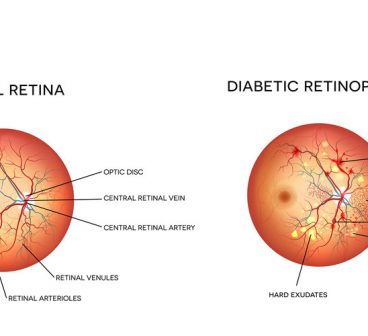Diabetic retinopathy is a condition where diabetes causes damage to the retina. It is the leading cause of blindness among American adults. Sadly, many instances of vision loss from diabetic retinopathy could have been prevented with appropriate treatment and regular eye exams. Once damage has occurred, it is not possible to regain lost vision.
Light-sensitive tissue comprises the retina that lines the back of the eye. With diabetic retinopathy, changes to blood vessels in the rear of the eye cause bleeding or leaking fluid, which starts to distort vision. The changes in blood flow happen because diabetes (especially uncontrolled diabetes) can create chronically high blood sugar. This damages very small blood vessels in the retina and eventually leads to retinopathy.
There are four stages to this type of retinopathy:
- Mild nonproliferative retinopathy is when small areas of the blood vessels sweet and balloon. These are called microaneurysms and may begin to leak fluid into the retina.
- Moderate nonproliferative retinopathy happens as the disease progresses. Blood vessels that supply the retina with blood and essential nutrients may swell and distort. When this happens, they may also lose their ability to transport blood. This may contribute to diabetic macular edema (DME).
- Severe nonproliferative retinopathy is when several blood vessels are blocked, depriving blood supply to parts of the retina. These problem areas secrete materials that tell the body to grow new blood vessels in the retina.
- Proliferative diabetic retinopathy (PDR) is the advanced stage of diabetic retinopathy. Growth factors secreted by the retina cause too many new blood vessels to form. They grow inside the retina and into surrounding areas, but are fragile and likely to leak and bleed. Scar tissue can shift and cause retinal detachment. If the retina pulls away from underlying tissue, permanent vision loss may occur.
If you have diabetes, it is very important to control blood sugar to guard against developing symptoms. Make sure that you are working closely with a qualified doctor to manage your care and have regular follow-ups.
The same is true for eye care with diabetes. Diabetic eye disease is a group of several eye conditions that are commonly caused by diabetes. These conditions include diabetic retinopathy, diabetic macular edema, cataracts, and glaucoma. If caught in time, treated, and managed as part of a diabetes care plan, many people can maintain their vision or slow the progression of trouble seeing.





